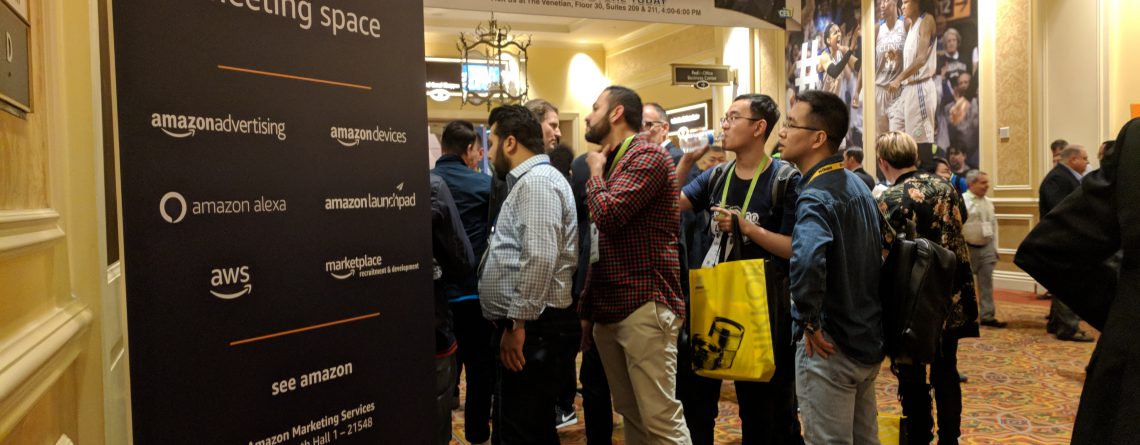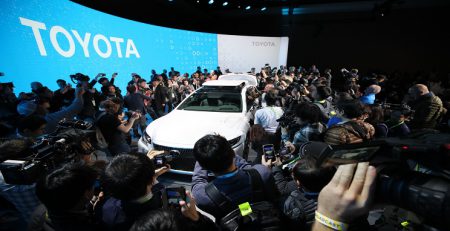A Telecom Analyst’s Take On CES 2018
For most of my career, I’ve been focused on the telecom industry and its components. I’ve been to dozens of telecom-focused conferences & exhibitions, in Asia and the Americas. I had never been to a consumer-focused show, though. In order to learn a bit (and check out some cool new devices), I spent a few days at CES in Las Vegas last week.
It was as chaotic as promised, but also a geek’s paradise. Loads of new tech was shown off in AI, IoT and smart cars. Telcos had a limited presence, but another type of network operator – those building webscale networks – was well represented.
Webscale at CES
Of the biggest companies building webscale networks, most had some sort of CES presence.
As covered widely elsewhere, Google’s Assistant and Amazon’s Alexa were hard to hide from, and overpowered Microsoft Cortana’s limited presence. Apple’s late 2017 decision to postpone the launch of its HomePod (powered by Siri) prevented it from making any kind of CES splash. The absence of Apple in the market, and Cortana’s failure to withstand the competition, left the turf wide open for Google to take on Amazon.
Monorail sponsorship paying off for Google
Chinese providers Baidu and Alibaba were also standouts; both sent impressive speakers and invested heavily in booth space. Baidu’s CES presence had self-driving as the centerpiece. The company formally announced its “Apollo 2.0” platform, in collaboration with 90 partners. Its booth showcased partners’ applications of Apollo in various mobility scenarios, including passenger vehicles, public buses and shared transport services. At the event’s “Mobile Innovation” keynote session, Baidu’s COO Qi Lu expanded on the driving focus, saying the company is “scaling everything around cars”. One positive for vendors: Lu argued that the transition to 5G should accelerate because of advances in AI – and the attendant need for more speed, security, and mobility.
For its part, Alibaba positioned itself well as an industry matchmaker at CES. It sponsored dozens of tiny suppliers in its “sourcing” tent – all of which use the Alibaba platform to serve customers. These suppliers sold every type of electronic under the sun. Some don’t even have products; Alibaba GM Kuo Zhang explained that he encouraged Chinese companies with “incomplete ideas” to come to CES, to meet people. On the buyer side, Alibaba explained in a breakout session how it aims to “de-risk” transactions by providing services like virtual reality factory inspection. That not only drives commerce on Alibaba.com, it also generates lots of traffic for the Alibaba Cloud to manage.
To provide some context, Figure 1 illustrates network-related spending for the top 8 webscale network operators, in 2016. As shown, Baidu & Alibaba are among the smaller companies, but both are growing quickly.
Figure 1
Robots? Be patient. Drones? Watch your head.
CES had hundreds of companies demo’ing robotics of various flavors. This is far from my usual focus, but intriguing. Luckily, I got an hour before CES opened to tour the robotics section. Lots of neat toys, but my impression is the space is very early stage. In a conference session, a speaker noted that the closest thing to a mass market consumer robotic device so far is a vacuum cleaner, iRobot’s Roomba. While this is now being equipped with WiFi connectivity, app control, and dead zone detectors, (because, why not), it’s a simple product yet still only has sold 20 million units since its 2002 release; Apple sold over 200 million iPhones in its last fiscal year.
Beyond household appliances, there is a lot of innovation around sports & games. For instance, one exhibitor demo’d a robotic ping-pong player; cool, but rudimentary so far, and hard to see a mass market application. They will come, though.
Omron’s ping-pong playing robot
As for drones, also beyond my usual telecom focus, they were all over the place. Up, down, and in your face. The range of applications (agricultural monitoring, vaccine delivery), form factors, and swarming capability was impressive. But as with many devices, drones come along with privacy and security issues. China’s drone industry is proliferating rapidly, and aiming for US growth. That could raise some national security implications. With news last week that Huawei & ZTE are facing political opposition in the US again, watch this space.
IoT devices
For anyone skeptical of the Internet of Things, CES did not disappoint. Loads of ideas seemed to have little practical use, or were overly complex. The Daily Beast’s recap put it well: CES Was Full of Useless Robots and Machines That Don’t Work. The popular Internetofshit Twitter feed suggested CES should just be renamed IOS.
But this is too easy a critique. The market is young, and the barriers to entry are low – naturally lots of inane ideas get floated. And let’s not forget that major innovations often have unexpected sources, or look silly at the time. One exhibitor, Petrics, was presenting a smart dog bed last week, equipped with sensors to monitor weight & activity. I laughed at first, but the only pet I own is a desert tortoise. Not much of a commitment. Dog-owners, though, spend hundreds of dollars per year on food and medical care. In the US, it works out to about 1% of spending for the “average” household; pet-owning households spend more. Dogs are often integral members of their owners’ family, so naturally health is important. IoT for pets could go somewhere.
Petrics’ Smart Pet Bed
Who will benefit from this sort of thing? Telcos clearly want a piece of any IoT action, and have home networking & monitoring solutions to target this, on top of connectivity. The actual revenues from these sorts of consumer-focused services are largely speculative though.
Among the many reasons for this: interoperability in the IoT space is not well developed. That was made clear at the CES session on “Connected Ecosystems”. These devices not only have to work on their own – which they often don’t – but also interoperate with other devices. T-Mobile VP for IoT and M2M, Balaji Sridharan, noted that there is “huge value in two or more IoT systems talking to each other,” as interoperability is mostly ad-hoc right now. Zigbee’s President, Tobin Richardson, says it aims to help create a “frictionless environment” for connecting devices, but admitted this is extraordinarily complex in practice. Even for a relatively simple use case, lighting, just defining “on” and “off” in a standard is not straightforward. And Zigbee is not the only standards/certification body to consider; the Open Connectivity Foundation is also important. There are also a wide range of other standards, certification, energy usage, and other bodies relevant to specific types of equipment in the home (televisions, speakers, etc.) and for general safety (e.g. NSF International).
Beyond ease of use and interoperability, security & privacy is crucial in the home. Sridhar Kumaraswamy, who oversees Home Systems for Philips Lighting, noted that devices & home networks must not only be secure when installed, but easy to keep updated since consumers tend to be busy and not technically sophisticated. Currently, IoT is very much a “caveat emptor” environment for consumers. On that note, Amazon Web Services’ GM for IoT Analytics & Applications, Sarah Cooper, noted that AWS assumes it cannot secure every device on the network, so it focuses on monitoring “behavior and deviations.” That’s increasingly the approach taken by cloud-based providers.
The rise of “AI first” companies
Companies old and new see the benefits of artificial intelligence (AI)-based tools; that was an important theme at CES. Some are going further, and putting AI at the center of their messaging. Baidu and Google speakers both emphasized last week that they were “AI first” companies, or had AI at the center of their strategies. IBM is getting there, as it develops Watson and leverages recent acquisitions. These three companies are between 17 (Baidu) and 106 years old (IBM), though. While all three are positioned well now (along with several others), is this market likely to be kind to incumbents? Over three years, maybe, but 10 or 15? The shift to autonomous autos alone is likely to create some new industry giants we haven’t yet heard of.
As awe-inspiring (and frightening) as some AI innovations are – especially when combined with robotics – it’s early. Humans are still in control. The singularity isn’t here yet. Moreover, AI has limitations. Lacking a moral code is one; as Cisco’s VP for Worldwide Services Strategy & Innovation, Rajat Mishra, noted, “we cannot outsource morality to AI.” That puts the brakes on lots of things. Or should. IBM Watson’s CTO Robert High reminded the audience of another limit of today’s AI: “these things are not deterministic, so you should not apply to applications that require high levels of accuracy” such as financial statement auditing.
One takeaway from CES overall, in the AI arena: tech companies are not being frank about job loss questions. When this issue arises, the answer is often something like this: AI will improve the drudgery of jobs, and let employees focus on more meaningful tasks; some job loss may occur in the transition, but it will be the dull jobs that go away. There is plenty of truth to that. But it’s also true that companies are already investing in AI, and it’s often specifically in order to reduce headcount. The use of things like chatbots in call centers won’t decimate entire industries, but things will get worse. This is something we’re watching closely in the telco arena. We expect telcos to be get more aggressive about cutting staff count in the next 2 years, and AI tools are one way to get there.











